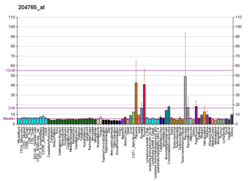| ARHGEF5 |
|---|
|
| Identifiers |
|---|
| Aliases | ARHGEF5, GEF5, P60, TIM, TIM1, Rho guanine nucleotide exchange factor 5 |
|---|
| External IDs | OMIM: 600888; MGI: 1858952; HomoloGene: 66300; GeneCards: ARHGEF5; OMA:ARHGEF5 - orthologs |
|---|
| Gene location (Human) |
|---|
 | | Chr. | Chromosome 7 (human)[1] |
|---|
| | Band | 7q35 | Start | 144,355,288 bp[1] |
|---|
| End | 144,380,632 bp[1] |
|---|
|
| Gene location (Mouse) |
|---|
 | | Chr. | Chromosome 6 (mouse)[2] |
|---|
| | Band | 6|6 B2.1 | Start | 43,242,516 bp[2] |
|---|
| End | 43,266,254 bp[2] |
|---|
|
| RNA expression pattern |
|---|
| Bgee | | Human | Mouse (ortholog) |
|---|
| Top expressed in | - skin of leg
- skin of abdomen
- mucosa of transverse colon
- left lobe of thyroid gland
- right lobe of thyroid gland
- duodenum
- minor salivary glands
- human kidney
- body of pancreas
- prostate
|
| | Top expressed in | - skin of external ear
- epithelium of stomach
- duodenum
- lip
- jejunum
- large intestine
- colon
- pyloric antrum
- mucous cell of stomach
- left colon
|
| | More reference expression data |
|
|---|
| BioGPS |  | | More reference expression data |
|
|---|
|
| Gene ontology |
|---|
| Molecular function | - GTP binding
- protein binding
- lipid binding
- guanyl-nucleotide exchange factor activity
| | Cellular component | - cytoplasm
- cell projection
- plasma membrane
- nucleoplasm
- cell junction
- podosome
- nucleus
- cell periphery
- cytosol
| | Biological process | - intracellular signal transduction
- regulation of actin cytoskeleton organization
- positive regulation of JUN kinase activity
- regulation of GTPase activity
- positive regulation of DNA-binding transcription factor activity
- positive regulation of podosome assembly
- myeloid dendritic cell chemotaxis
- positive regulation of GTPase activity
- positive regulation of protein import
- regulation of ERK1 and ERK2 cascade
- regulation of Rho protein signal transduction
- regulation of cytoskeleton organization
- actin cytoskeleton organization
- positive regulation of stress fiber assembly
- positive regulation of apoptotic process
- regulation of small GTPase mediated signal transduction
- G protein-coupled receptor signaling pathway
| | Sources:Amigo / QuickGO |
|
| Orthologs |
|---|
| Species | Human | Mouse |
|---|
| Entrez | | |
|---|
| Ensembl | | |
|---|
| UniProt | | |
|---|
| RefSeq (mRNA) | | |
|---|
| RefSeq (protein) | | |
|---|
| Location (UCSC) | Chr 7: 144.36 – 144.38 Mb | Chr 6: 43.24 – 43.27 Mb |
|---|
| PubMed search | [3] | [4] |
|---|
|
| Wikidata |
| View/Edit Human | View/Edit Mouse |
|


















